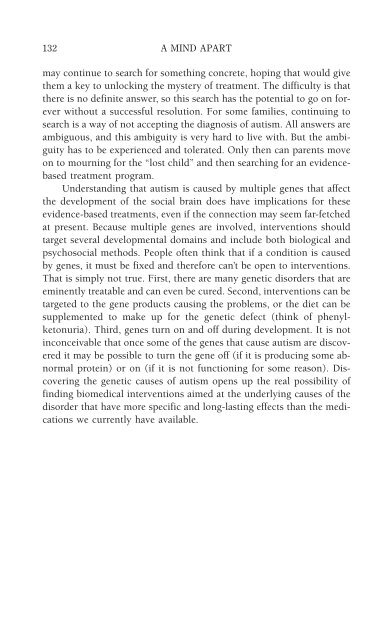978-1572305441
autism
autism
You also want an ePaper? Increase the reach of your titles
YUMPU automatically turns print PDFs into web optimized ePapers that Google loves.
132 A MIND APART<br />
may continue to search for something concrete, hoping that would give<br />
them a key to unlocking the mystery of treatment. The difficulty is that<br />
there is no definite answer, so this search has the potential to go on forever<br />
without a successful resolution. For some families, continuing to<br />
search is a way of not accepting the diagnosis of autism. All answers are<br />
ambiguous, and this ambiguity is very hard to live with. But the ambiguity<br />
has to be experienced and tolerated. Only then can parents move<br />
on to mourning for the “lost child” and then searching for an evidencebased<br />
treatment program.<br />
Understanding that autism is caused by multiple genes that affect<br />
the development of the social brain does have implications for these<br />
evidence-based treatments, even if the connection may seem far-fetched<br />
at present. Because multiple genes are involved, interventions should<br />
target several developmental domains and include both biological and<br />
psychosocial methods. People often think that if a condition is caused<br />
by genes, it must be fixed and therefore can’t be open to interventions.<br />
That is simply not true. First, there are many genetic disorders that are<br />
eminently treatable and can even be cured. Second, interventions can be<br />
targeted to the gene products causing the problems, or the diet can be<br />
supplemented to make up for the genetic defect (think of phenylketonuria).<br />
Third, genes turn on and off during development. It is not<br />
inconceivable that once some of the genes that cause autism are discovered<br />
it may be possible to turn the gene off (if it is producing some abnormal<br />
protein) or on (if it is not functioning for some reason). Discovering<br />
the genetic causes of autism opens up the real possibility of<br />
finding biomedical interventions aimed at the underlying causes of the<br />
disorder that have more specific and long-lasting effects than the medications<br />
we currently have available.



